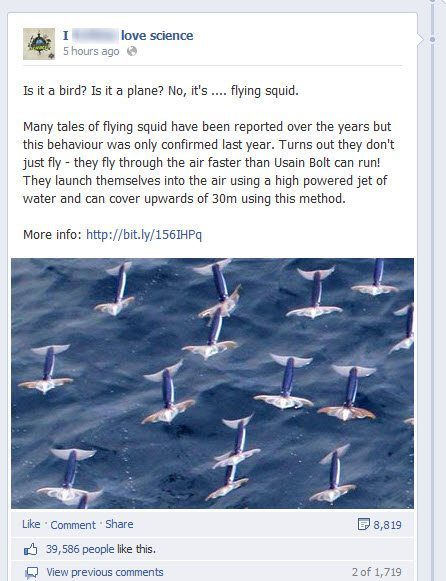You may have noticed weird looking links in your online life, like in your Facebook or Twitter feed. And you may also notice them in places like magazines.
Here’s an example (I blurred part of the page name because it’s a naughty word):

These bit.ly, owl.ly, tinyurl.com and other links are basically short links. People use these services to make shorter links… and to track those links.
First, let’s talk about the short part.
The actual link above, unshortened, would be: http://newswatch.nationalgeographic.com/2013/02/20/scientists-unravel-mystery-of-flying-squid/
As you see, that’s way longer. That link would barely fit in a tweet by itself, let alone leaving room for any kind of commentary. Because Twitter has a 140 character limit.
But you may ask yourself, “Facebook has no limits. Why do I care about using short links on Facebook?”
This is where the tracking part comes in:

We see that this link was first shortened in 2013, so this isn’t new news. The 6,566 clicks in the last hour is likely from this one Facebook share.
Now the ‘I ******* love science’ Facebook page isn’t owned (at least that anyone knows of) by National Geographic (the place where the flying squid article was posted). So the only way the can know if people are clicking on something they are sharing on a website that doesn’t belong to them is to use a short/tracking link.
If you are sharing a link to your own website, you can see the data (who clicks and beyond). But these short/tracking links are specifically for:
1) When you need something short (like you have a magazine article and want to send people to the online video corresponding to it). The less someone has to type, the less likely they are to mistype!
2) When you need to track something you can’t normally (a click to a Twitter profile from Facebook, a link to another website, etc.)
So let’s look at this flying squid post in more detail:
76,702 people clicked on the link (from Bitly.com)
35,986 people liked it (from Facebook post)
8,819 people shared it (from Facebook post)1,719 left a comment (from Facebook post)
A majority of your fans/friends will never say a word about what you post. As you see, most people don’t. The lowest commitment thing you can do when someone shares a link is click on it. The next level of interest is liking it, etc. The highest level of interest is someone saying something about it… and as you see most people never get there. Of the 76,000+, less than 2,000 people actually said something about it.
So thinking the only people interacting with you are your commenters is a mistake. Many people will tell you what they like (and don’t) silently with a click (or a lack of click).
The I ***** love science Facebook page is smart: they are actively tracking what people do and don’t like and refining what they share accordingly.
And now that you know that you can make tracking links using services like bitly (free), you can do the same!
